Coronavirus Australia live news: Acting chief medical officer Michael Kidd rules out stadium vaccination sites
The top health officer says supply and administration of jabs will increase in the coming weeks, and established facilities are up to the task of inoculating the nation.
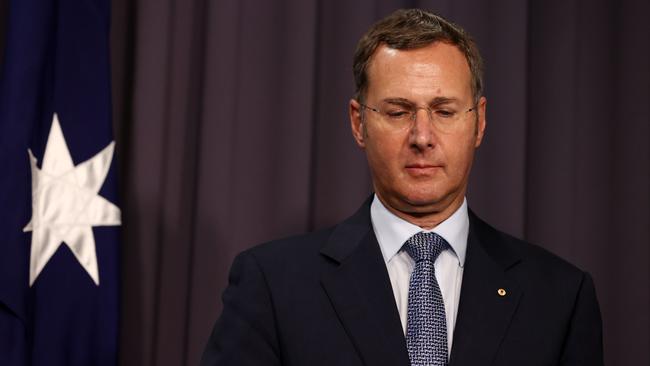
- Blood clot case likely linked to vaccine: Kidd
- Senator Jim Molan diagnosed with cancer
- Miles invokes Higgins in vaccine stoush
- China winning Pacific vaccine diplomacy war
- Engineers investigate Brisbane hospital clusters
- Unis must look beyond China
Steven Miles accuses the PM of using issues with the COVID-19 vaccine rollout as a distraction from “Brittany Higgins, rape and sexual harassment” in Canberra. Acting Chief Medical Officer Michael Kidd says a case of blood clotting in a Melbourne man who received the AstraZeneca vaccine is “likely” to be related to the immunisation. A crew of Brisbane engineers is set to launch an investigation into the Princess Alexandra Hospital’s Ward 5D in a bid to understand the origins of two seperate COVID-19 clusters. And Australia is in a race against time to secure millions of COVID jabs for the Pacific in the next four weeks or risk a Chinese vaccine diplomacy victory that would push regional partners closer to Beijing.
Rachel Baxendale 9.30pm:All hotel staff get jabs ahead of flights
All of Victoria’s hotel quarantine workers who have contact with returned travellers will have had a COVID-19 vaccination when international flights into the state resume on Thursday.
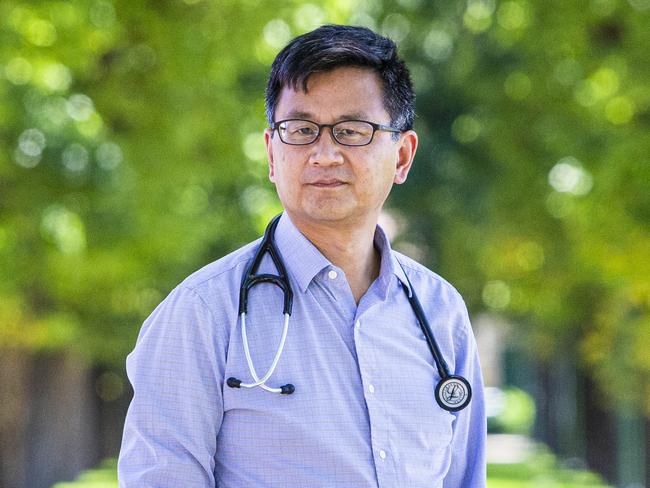
The Andrews government said on Monday 4984 first doses of the vaccine had been administered to “almost all” hotel quarantine workers — including COVID-19 Quarantine Victoria staff, hotel staff, police and Australian Defence Force personnel — while 2283 of them had had their second doses.
In NSW, all hotel quarantine workers had received their first jab by March 24, while in Queensland 89 per cent of frontline health workers and people working in hotel quarantine had received at least the first dose of the vaccine as of last Wednesday.
An Andrews government spokeswoman said a review of Victoria’s hotel quarantine program by Deputy Chief Health Officer Allen Cheng had recommended hotel quarantine workers in resident-facing roles receive the first vaccine dose prior to international flights resuming.
“Second doses are well under way, with all expected to be completed by the end of April. An ongoing vaccination program will continue for new staff,” she said. “Only those vaccinated with at least one dose will be working in the hotel quarantine program.”
Adeshola Ore 8.45pm: Younger people baulk at vaccine
Young and low-income Australians are most hesitant to receive a COVID vaccine, with a new study revealing the need for tailored messaging to increase the uptake of the immunisation program.
The results from a global PwC study come as the federal government seeks to assure the public that the AstraZeneca vaccine is safe for use after a Melbourne man who received the jab last week fell ill with a rare blood-clotting condition. Acting Chief Medical Officer Michael Kidd said it was likely the clotting was related to the vaccine, but he stressed that serious illness or death among unvaccinated Australians posed a far greater risk.
Professor Kidd said international data showed one to two cases of clotting, or thrombosis, were reported in every one million people who received the AstraZeneca jab — significantly lower than the one to two deaths per 100 people infected with the virus.
Jess Malcolm 8.10pm:UK to announce new international travel rules
Britain is expected to unveil plans to restart international travel on Monday, local time, as the UK celebrates 31 million people vaccinated with their first dose against COVID-19.
The government has tentatively set a date to ease travel restrictions on May 17, with destinations ranked green, amber or red based on the virus threat.
People heading to low-risk green countries will simply take a virus test before and after they travel, but those going to amber or red destinations will have to self-isolate or quarantine afterwards.
“We are doing everything we can to enable the reopening of our country...as safely as possible,” british Prime Minister Boris Johnson said.
The government has refused to unveil which countries would be green.
The British government is also planning to trial a virus certification system that will allow people to attend events such as football matches, and also roll out two free rapid tests for all residents from Thursday.
READ MORE: Smart traffic lights help slow pedestrians
Krithika Varagur 7.40pm:The post-pandemic office is here — in Australia
When Shant Soghomonian, a senior sales director at Dell, went back to his office in Sydney last month after a year of remote work, the space looked the same as he remembered, and he didn’t even have to wear a mask. But when he stepped into a sanitised conference room for his first in-person meeting of 2021, he realised he had forgotten how to greet colleagues in person.
“Do you shake their hands? Do you do the elbow bump?” recalls Mr Soghomonian. A consensus eventually arose around “predominantly elbows,” he says.
Mr Soghomonian and about 2,000 of his Dell colleagues in Australia have been able to go in-person to their offices for months. On March 9, Dell’s six Australia offices entered their third and final phase of reopening. Meanwhile, about 41,000 Dell employees in the U.S. remain fully remote — at “phase 0” — for the near future, according to a Dell spokesman.
Australians’ return to work gives a taste of what the post-pandemic office might look like in other countries soon. The country of nearly 26 million people has been at the vanguard of the worldwide effort to reopen offices. Its strict early lockdown, intensive contact-tracing and aggressive quarantine protocols have helped keep daily new cases very low for months and total number of deaths under 1,000 since the pandemic started, according to its Department of Health. Offices of multinational firms like Adobe, Facebook, and Dell started to reopen as early as June.
But it hasn’t been a straight line from quarantine to unmasked meetings. Most offices had to slowly phase back re-entry, prepare for workers’ skittishness in communal spaces and in meetings, and counter people’s reluctance to commute again.
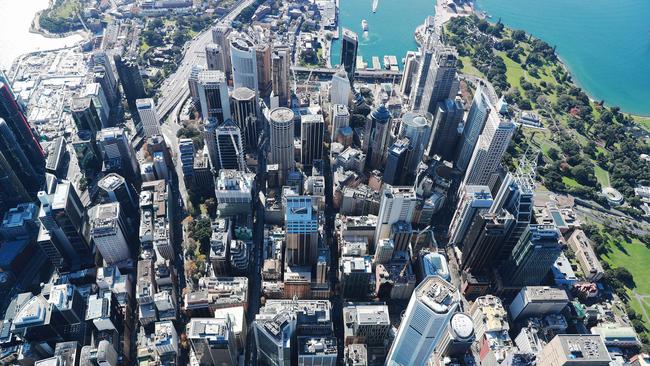
Henry Zeffman7.05pm:Boris’ plan to get UK back to ‘normal’
Everyone in England should be tested twice a week for coronavirus so that “we can get back to seeing the people we love”, Boris Johnson will say today.
Rapid tests that indicate whether individuals have the virus within 30 minutes will be available to every adult twice a week, regardless of whether they have symptoms or have been vaccinated.
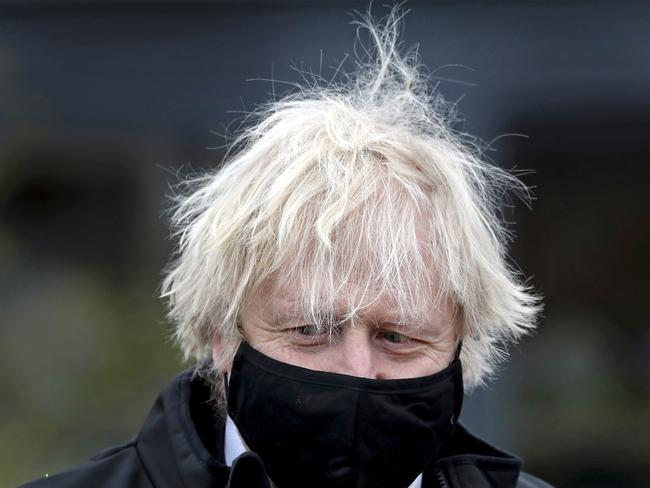
The increased testing, which begins this Friday but has been practised by older children since they returned to school last month, will “help prevent outbreaks and help us reclaim a more normal way of life”, the government said. The tests will not be compulsory.
They will also assist attempts to act quickly against variants of concern as officials are more likely to spot new clusters of cases early. The government said that rapid testing, which has also been used for frontline health workers and care home staff and residents, had already identified more than 120,000 cases that would not otherwise have been known.
Adults in England will be able to order the lateral flow testing devices to their home or collect them from local pharmacies or testing sites. As the economy reopens many will be able to get a rapid test at their place of work, with 100,000 businesses having registered an interest in providing them to their employees. Individuals who are tested at home will need to record their results online or by calling NHS Test and Trace. Those who test positive will be instructed to self-isolate and order a more accurate PCR test. For every 1,000 lateral flow tests carried out there is less than one false positive, recent NHS analysis has found.
The mass testing plan, the first proposals for which were revealed by The Times in February, will be bolstered by an advertising campaign encouraging people to take the tests twice a week.
Anton Nilsson6.30pm: Stadium vaccination sites ruled out
The country’s top health officer has insisted COVID-19 vaccination efforts are ramping up quickly, as the federal government faces heavy criticism over a relatively slow rollout and missed targets.
Acting chief medical officer Michael Kidd said on Monday both supply and administration of jabs would increase in the coming weeks, and that GPs and other established facilities were up to the task of inoculating the nation.
Mega-vaccination sites such as sporting stadiums, as seen in the US, won’t be necessary, he said.
“At the moment we don’t need that sort of system because we are rolling out the system effectively,” Mr Kidd said.
The 1,500 general practice clinics involved in administering coronavirus vaccines will double by the end of the week, and are set to hit 4,000 by the end of the month, he said.
Vaccination sites will also include some of the approximately 100 respiratory clinics around the country, established by the federal government last year for COVID-19 testing.
Some of those have already been set up to function as vaccination centres, Mr Kidd said.
David Swan 6.06pm:Why the government’s COVIDSafe app failed
The 27th of this month will mark the 1st birthday of the Australian government’s COVID-19 contact tracing app. You know, the one that keeps a log of bluetooth connections your smartphone makes with the mobiles of people you’ve come into contact with?
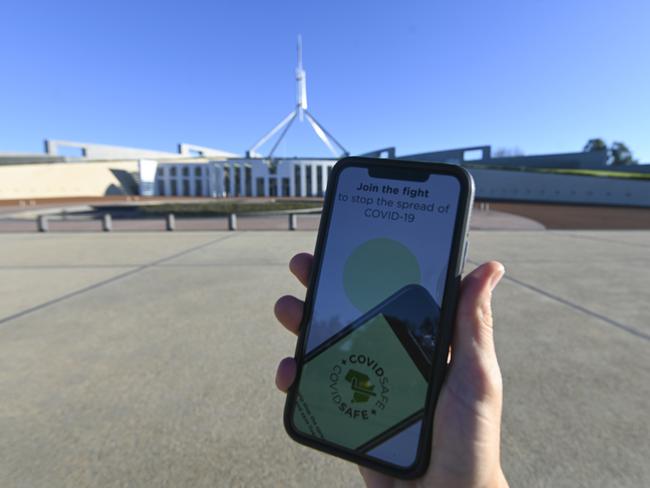
The one that would make it simpler for health authorities to trace potential COVID-19 carriers in the case of a positive diagnosis? The one that just under half of us would need to download and use?
Australia is not unique when it comes to launching a COVID contact tracing app that didn’t quite live up to the hype.
Stuart Wemyss5.35pm: How to play rising property prices
Almost everyone is predicting that property prices will surge higher this year. In fact, the newspapers are already full of stories about properties selling well above reserves.
Low stock levels are partly responsible for the exuberant market. That exuberance might cool as more stock becomes available. But the RBA and the government do not want prices to rise too quick as it might create a bubble, and all bubbles pop eventually.
Westpac’s chief economist, Bill Evans, predicts that Australian property prices will rise by 20 per cent over the next two years. Most other economists agree with him.
According to ABS lending indicators, the property market is still dominated by owner-occupiers.
However, as overall sentiment improves, it is likely that investors will return to the market, and that could further fuel price rises. The government could become concerned if it believed growth rates were unsustainable.
Ewin Hannan4.45pm:PM calls for ‘cautious approach’ to minimum wage
The Morrison government has warned increasing the minimum wage this year could be a “major constraint to small business recovery” and cost jobs, sparking fresh conflict with the union movement which is pushing for a $26-a-week pay rise for 2.3 million workers.
While not explicitly backing business calls for a minimum wage freeze, the government urges the Fair Work Commission to take a “cautious approach” to its minimum wage deliberations given the current uncertainties in the domestic and international economic outlook.
The government says while the economy is expected to grow by 4.5 per cent in 2021, “the risk of domestic outbreaks and ongoing disruptions to other major economies mean the economic environment remains uncertain”.
“Although the vaccine rollout is underway, COVID-19 outbreaks that would necessitate further containment measures remain a significant risk and even localised outbreaks could have an impact on consumer and business confidence weighing on consumption and investment,” it says.
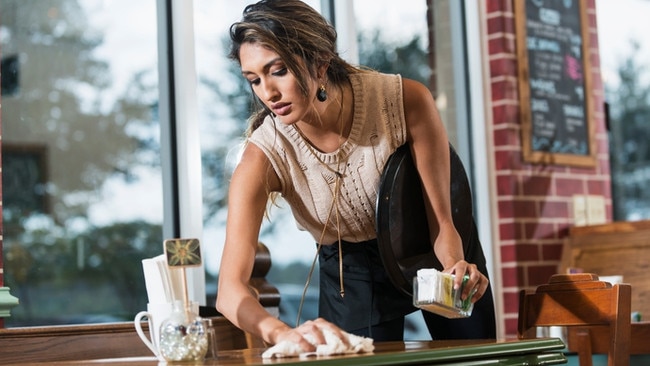
The government says the commission should take into account the importance of creating jobs and ensuring the viability of businesses, particularly small businesses.
“While the government has provided significant support to small businesses, given the continuing uncertain global and domestic economic outlook, higher labour costs during this challenging period could present a major constraint to small business recovery and may dampen employment in the sector.”
ACTU assistant secretary Scott Connolly said on Monday that “while the government didn’t have the guts to say it explicitly, it has given the green light to the Fair Work Commission to freeze the minimum wage, relied on by one in five workers”.
“The hypocrisy of the Federal Government is breathtaking – they say it’s fine to get rid of JobKeeper because the economy is recovering, but workers shouldn’t have a pay rise because the economy is faltering. They can’t have it both ways,” he said.
READ the full story
Staff writers4.20pm:China records biggest Covid case jump in two months
China has reported 15 new cases of COVID-19, it’s biggest daily jump in cases in more than two months.
All the new cases were found in the city of Ruili, a transit point on the border with Myanmar.
The new cases were locally transmitted but appear to have originated in Myanmar.
Local authorities have begun a vaccination drive in Ruili in a bid to contain the virus and build up herd immunity in the city.
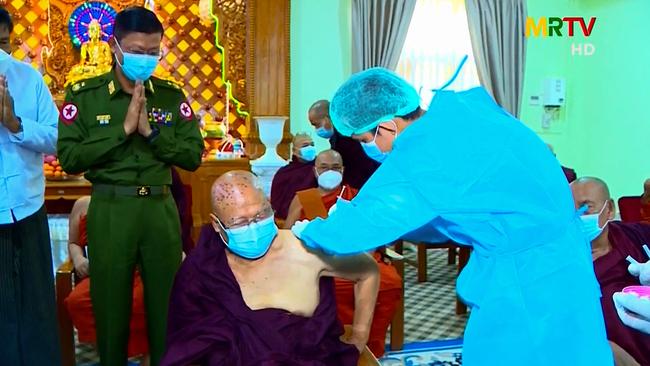
Adeshola Ore3.42pm:Blood clot case ‘likely’ linked to vaccine: Kidd
Acting Chief Medical Officer Michael Kidd says a case of blood clotting in a Melbourne man who received the AstraZeneca vaccine is “likely” to be related to the immunisation.
The Friday hospitalisation prompted an urgent meeting of independent experts on Saturday morning. But the Australian Technical Advisory Group on Immunisation and the Therapeutic Goods Administration did not recommend changes to the vaccine rollout. Professor Kidd said the Australian Technical Advisory Group on Immunisation is continuing to liaise with the European medicines agency to discuss similar data of similar cases that have been reported in other countries.
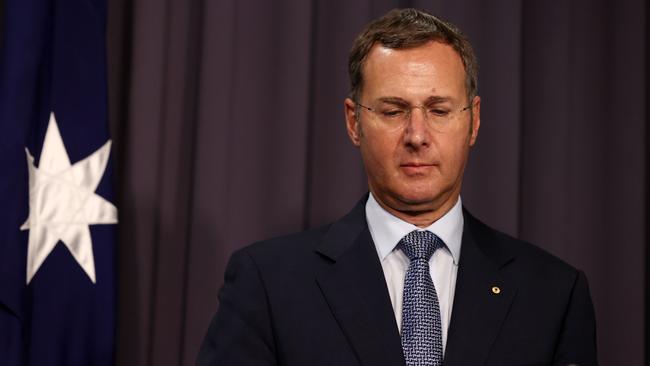
“While at this time we don’t have definitive evidence of causality, the clinic features of the case report on Friday are consistent with what we have seen in international reports of similar cases,” Professor Kidd said.
“It is likely the case reported on Friday is related to the vaccine, which would be consistent with that international experience.”
Australia reported no new cases of community transmission in the past twenty-four hours. The 10 new cases were in returned travellers in hotel quarantine.
READ MORE:Vaccine army doubles coronavirus fight
Anton Nilsson3.30pm:Art director turns quarantine hotel room into Wild West
A returning Aussie traveller turned his quarantine hotel room in Brisbane into a Wild West saloon.
Dave Marriott, 57, was placed in the Rydges South Bank hotel in the Queensland capital on his way home to Sydney after returning from a UK visit.
Being stuck in a hotel room for two weeks might sound boring, but Mr Marriott found a way to entertain himself by creating a cowboy-themed world using fast-food containers and paper bags.
“Reading and watching TV got tiring after a few days, I’ve had much more fun making things,” he said.
What inspired the cowboy outfit was a cardboard poke bowl left over from a meal.
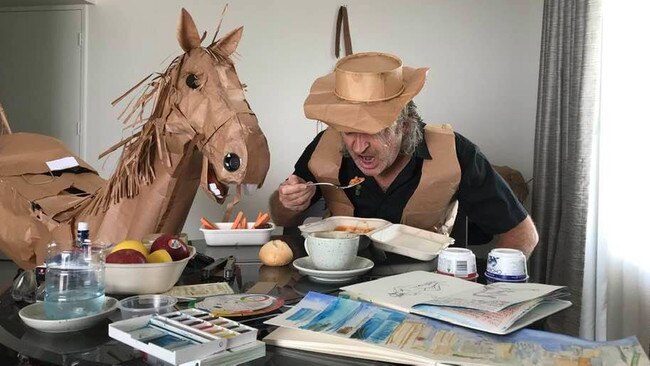
“I thought, that’s a really good beginning of a hat,” Mr Marriott said.
“Then I made the waistcoat, chaps, belt, gun and an ammo thing.
“I thought, ‘I’m going to need a horse’. Obviously, a horse has got four legs, and when I was looking in the cupboard I found an ironing board and thought, ‘I’m halfway there’. I used a desk lamp from the office for a neck, popped bags on (and) that’s it – that’s a horse.”
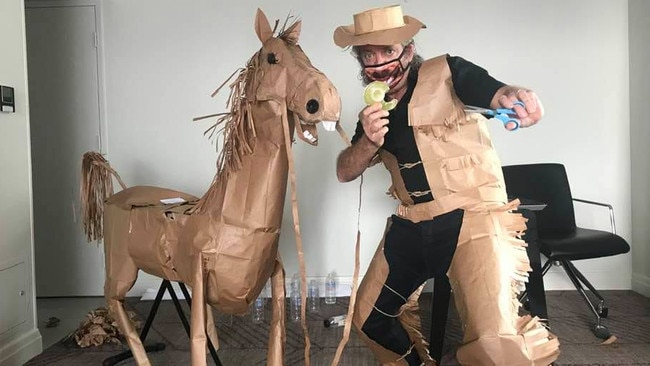
Mr Marriott works as an art director in film and TV and has experience sewing his own clothes, which helped him figure out how to make his cowboy character come to life.
“I’ve got all kinds of tricks and skills I’ve picked up over the years. What was most handy was pattern making – I’ve made dungarees for myself, and the pattern making paper is pretty similar to the paper bags,” he said.
He has until Friday until the mandatory quarantine period is over – plenty of time to finish his next project.
“I’m going to try to make a little movie. I haven’t really written the script down, it’s all in my crazy befuddled head.”
He’s even made himself a nemesis – the Cling Film Cowboy.
“The Cling Film Cowboy is in town, I’ve finished his outfit and maybe I’ll do a little film shoot tomorrow,” Mr Marriott said.
Adeshola Ore3.05pm:Senator Jim Molan diagnosed with ‘aggressive’ cancer
NSW Liberal Senator Jim Molan has revealed he has been diagnosed with an “aggressive form of cancer” and will take leave from the Senate.
Senator Molan said he would have further testing to confirm the prognosis and commence treatment after he was diagnosed with the cancer last week.
“Although I am personally stepping back for a while, my office will remain open and fully operational. My team will continue to work hard alongside my colleagues in the Morrison government on the issues that matter,” he said in a statement.
“My commitment to service you. the people of NSW and Australia, has not wavered.”
— Senator Jim Molan AO DSC (@JimMolan) April 5, 2021
READ the full story
Nicholas Jensen 2.15pm: WA reports no new local cases
Western Australian has reported no new local cases of COVID-19, with one case recorded in hotel quarantine.
The new case is a man in his 30s who has returned from overseas and is currently in hotel quarantine in Perth.
Media statement: COVID-19 update 5 April 2021 https://t.co/S5zb79HbUk
— WA Health (@WAHealth) April 5, 2021
WA Health is monitoring 17 active cases of COVID-19 and 922 people have recovered from the virus in WA.
WA Health has administered 57,018 COVID-19 vaccinations, including 8,520 people who have received both doses.
146 people received a COVID-19 vaccine in the last 24 hours.
READ MORE:Action on harassment to put onus on MPs
Nicholas Jensen1.40pm:Air NZ offers clue for trans-Tasman start date
New Zealand Prime Minister Jacinda Ardern is expected to announce the start date of a trans-Tasman bubble tomorrow, which could see the travel corridor between the two countries open as early as this Friday.
Air New Zealand is already offering daily flights between Auckland and Sydney, as well as Auckland and Melbourne from Friday April 9 - hinting at a potential start date.
The bubble will allow Australians and New Zealanders to travel between the two countries without having to undertake hotel quarantine at either end.
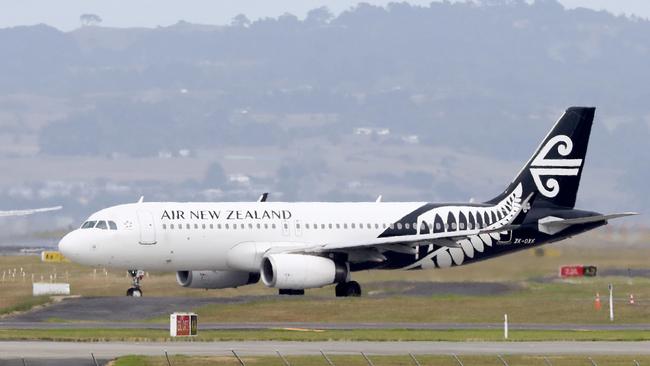
The prospect of a travel bubble has been intermittently discussed since the beginning of the pandemic last year, with politicians and health officials suggesting that the containment of COVID-19 in both countries meant there is a low risk of transmission, permitting safe quarantine-free travel.
While travellers from New Zealand could enter some Australian states without having to undertake hotel quarantine, this was only a one-way arrangement, requiring returning passengers to New Zealand from Australia to complete, and pay for, 14 days of managed isolation.
The trans-Tasman bubble removes this requirement.
Following a number of abortive attempts to secure the bubble, Ms Ardern said her government was confident it would soon be given a firm start date.
Last month Ms Ardern said a number of concerns needed to be resolved before the bubble could be implemented, citing potential for outbreaks, issues with contact tracing and transiting passengers as the major barriers.
Air New Zealand is also planning to launch its new route to coincide with the opening of the travel bubble, offering flights between Auckland and Hobart.
Qantas and Jetstar are also preparing to ramp up flights in time for the bubble’s opening.
Ms Ardern has said there will be no vaccine requirement for the travel under the trans-Tasman bubble.
Regarding travel into different Australian states, Ms Ardern said New Zealand will be taking a state-by-state approach, indicating only some states will be included in the bubble.
New Zealanders can currently enter New South Wales, Victoria, Queensland, the Australian Capital Territory, South Australia, Tasmania and the Northern Territory without having to quarantine, but not Western Australia.
READ MORE:Covid ‘just China’s first virus threat’
Rachel Baxendale1.05pm: Victoria vaccination reaches 116,677
The Victorian health department has now administered COVID-19 vaccine to 116,677 recipients, after 443 people were immunised on Easter Sunday.
Amid blame-shifting between the Morrison government and the states over the slow pace of Australia’s vaccine rollout, which saw fewer than a million people vaccinated by the end of March despite a target of four million, Victoria’s health department has stated in its daily COVID press release on Monday that state authorities are “now administering tens of thousands of vaccinations weekly.”
For more information on today’s #coronavirus (#COVID19) situation in Victoria, see today’s media release: https://t.co/cLRueXSdm0
— VicGovDH (@VicGovDH) April 5, 2021
“The rollout of the Commonwealth’s vaccine program at state-run sites in Victoria is ahead of schedule, and the trained health professionals administering these vaccines have been working incredibly hard since day one,” the department said.
“Many hubs and high-volume centres are vaccinating Victorians over the course of the four-day Easter long weekend to ensure the program continues, including at two of the state’s largest sites at the Royal Exhibition Building and Sunshine Hospital. Over one thousand doses of the vaccine were administered on Good Friday.
“Victoria is continuing to support the Commonwealth with its vaccination program with further expansion of the program dependent on vaccine supply.
“As part of the Commonwealth’s rollout, Victoria is responsible for providing vaccinations to workers in health, emergency services and other critical industries and public sector aged care residents and staff. The Commonwealth is responsible for the majority of vaccinations in Victoria in phase 1b and most of the vaccine supply in Victoria is provided to Commonwealth-run general practice sites.”
READ MORE:Vaccine scheme to get a boost
Nicholas Jensen 12.50pm:SA records no new local cases
South Australia has recorded no new local cases of COVID-19 in the last 24 hours, with two new cases detected in hotel quarantine.
South Australian COVID-19 update 5/4/21. For more information, go to https://t.co/mYnZsGpayo or contact the South Australian COVID-19 Information Line on 1800 253 787. pic.twitter.com/4DI8oS9K58
— SA Health (@SAHealth) April 5, 2021
Health officials confirmed there were 3,499 tests recorded to 8pm yesterday.
The state is currently monitoring 13 active cases, all of which were detected in hotel quarantine.
Health officials administered 174 vaccinations across the state yesterday, with a total of 28,933 administered since the beginning of the rollout.
READ MORE:Unis look beyond China, India for students
Lachlan Moffet Gray 12.15pm: KPMG joins vaccine passport push
The Australian government should remove barriers to foreign workers taking jobs in regional Australia and make it easier for skilled workers from Hong Kong to stay in the country while examining the practicality of a “vaccine passport” scheme in order to safely fill a labour shortage developing as the economy recovers from COVID-19, according to KPMG.
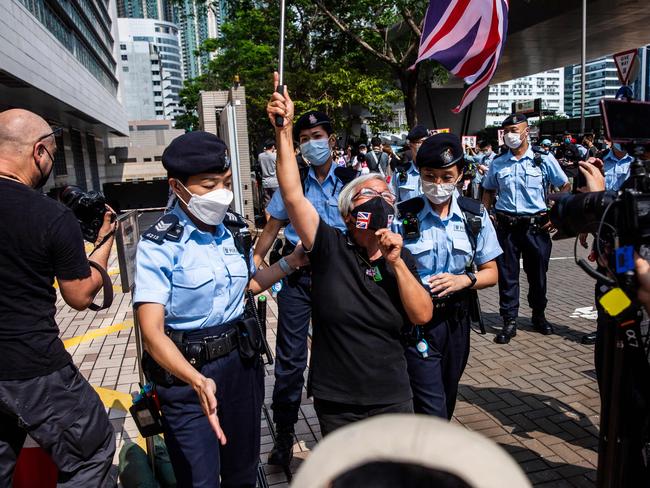
In its submission to the newly-minted parliamentary inquiry into Australia’s skilled migration program, the big four advisory and accounting firm says Australian businesses are “feeling acute labour shortages in areas historically temporary visa holders that have been restricted from entry due to border closures.”
KPMG Head of Migration Services Belinda Wright said a crucial short term reform would involve reviewing the potential application of a “risk-based” approach to restarting immigration, potentially through the use of a “vaccine passport” scheme of the kind rolling out in Israel and the EU and supported by Qantas.
READ the full story
Anne Barrowclough11.40am: NSW records no new cases, lifts restrictions
NSW has recorded no new cases in the past 24 hours, and will lift restrictions in the northern part of the state at 11.59 tonight. The restrictions were put in place after a cluster of cases in Byron Bay.
Temporary restrictions for the local government areas of Tweed Shire Council, Ballina Shire Council, Byron Shire Council and Lismore City Council will be lifted at 11.59pm tonight (Monday 5 April): https://t.co/p2VTPpf4CH
— NSW Health (@NSWHealth) April 5, 2021
Charlie Peel 11.05am:Miles: PM using vaccine issues as distraction
Queensland’s deputy premier has accused Scott Morrison of using issues with the COVID-19 vaccine rollout as a distraction from “Brittany Higgins, rape and sexual harassment” in Canberra.
Speaking in Brisbane this morning, Steven Miles said the federal government’s recent criticism of the slow rollout of the vaccine has been fuelled by the criticism of the culture in Canberra and the treatment of women working in Parliament House.
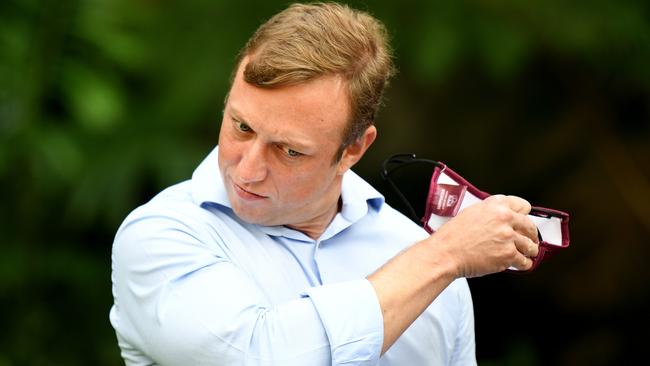
Mr Miles said he expected the Prime Minister would continue to highlight issues about the vaccine in the lead up to the national cabinet meeting on Friday.
“There’s been a lot of issues around since the last national cabinet,” Mr Miles said.
“No doubt the Prime Minister will continue to try to use the vaccine rollout and COVID more generally to distract from the government’s other problems.
“That’s been a very orchestrated campaign to try to stop you all (the media) talking about Brittany Higgins and rape and sexual harassment and all of the things that have happened in Canberra.”
Mr Miles criticised Defence Minister Peter Dutton’s comments claiming last week’s three-day lockdown of Brisbane was an over-reaction from Annastacia Palaszczuk.
“They were in fact so eager to distract everybody from those topics that they put at risk confidence in their own vaccine rollout program that continued yesterday with Peter Dutton’s outrageous attack on our premier,” Mr Miles said.
“If Scott Morrison stays true to form, then I’d expect over the coming days they will continue to find lots of distractions so people are talking about that and not the treatment of women in Canberra.”
Mr Miles said the proposed use of a quarantine facility to be built near the Wellcamp Airport in Toowoomba was a priority for the state government.
He said a dedicated facility would eliminate the need to reduce the intake of overseas arrivals in the event of an outbreak.
“Unfortunately we can’t get a straight answer or even a statement of support in principle out of Scott Morrison, that’s what we need.
“In particular we need their support to allow for repatriation flights to land at Toowoomba.
“If we got that go ahead when we first suggested this, we probably wouldn’t have needed that lockdown last week.”
READ MORE:PM, Hunt deserve egg on their faces
Mackenzie Scott 10.25am:No Queensland cases ‘underlines better to lockdown for 3 days’
No new cases of community transmission of COVID-19 have been discovered in Brisbane overnight.
Monday 5 April – coronavirus cases in Queensland:
— Annastacia Palaszczuk (@AnnastaciaMP) April 5, 2021
• 0 new locally acquired
• 4 overseas acquired
• 75 active cases
• 1,492 total cases
• 2,313,088 tests conducted
Sadly, six Queenslanders with COVID-19 have died. 1,353 patients have recovered.#covid19pic.twitter.com/eWFmckxJqw
Queensland Deputy Premier Steven Miles said the result was welcome, especially when compared to the Easter weekend last year.
“It underlines how it is better to lockdown for three days than three months,” Mr Miles said.
More than 7,500 tests were carried out yesterday.
Four new cases of the virus were detected in hotel quarantine, one from Papua New Guinea, two from Lebanon and one from India.
Mr Miles said Easter had been a “bumper” weekend for tourism, with 75.000 people arriving in Cairns from Sydney and Melbourne on cheap flights - 90 per ent of 2019 arrivals. Hotel occupancy was above 90 per cent, he said.
READ MORE:PM, Hunt deserve egg on their faces
Nicholas Jensen 10.00am:Virus fragments found in Melbourne wastewater
Several Melbourne suburbs remain on alert after fragments of COVID-19 were detected in the wastewater across the city, with residents urged to get tested as soon as possible.
Victorian health officials provided an updated alert last Friday, mentioning nine suburbs of concern, including Altona, Altona Meadows, Hoppers Crossing, Laverton, Point Cook, Seabrook, Seaholme and Williams Landing.
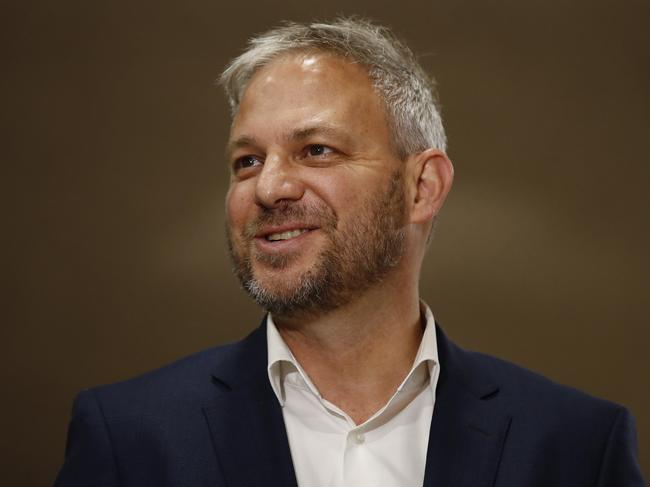
COVID-19 fragments were detected in a sewage sample collected from the Altona wastewater treatment plant, Victoria Health said.
The new discovery follows the detection of viral fragments in a catchment in Melbourne’s southeast and in the city’s west in February and March.
Last week Victoria’s Chief Health Officer Brett Sutton said the wastewater samples could have been caused by positive cases being in the early active infectious phase or because someone is continuing to shed the virus after the early infectious period.
READ MORE:Vaccine scheme to get a boost: Hunt
Nicholas Jensen9.40am:No new locally acquired cases in Queensland
Queensland Premier Annastacia Palaszczuk has announced there were no new cases of community transmissions overnight, with one case recorded in hotel quarantine.
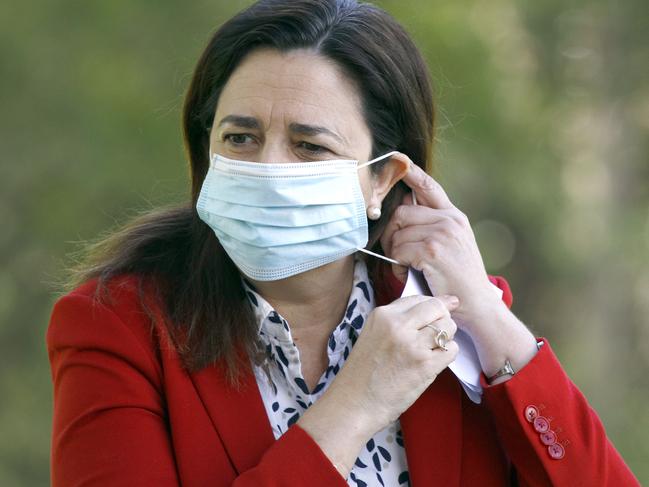
The state currently has 72 active cases and recorded 14,011 tests in the last 24 hours.
Ms Palaszczuk congratulated Queensland on its high testing rates and said the state has now administered 87,220 vaccinations.
The premier urged Queenslanders to stay safe over the Easter weekend and to get tested if they have COVID-19 symptoms.
READ MORE:Vaccine army doubles fight
Nicholas Jensen9.35am:UK to reopen with vaccination passports
British Prime Minister Boris Johnson is due to announce that all shops, restaurants, pub gardens in England can reopen at the beginning of next week, with vaccination passports set to be used as the key to unlocking the country’s ailing economy.
On Monday Mr Johnson is expected to confirm his plan to proceed with the passports, with all remaining non-essential shops, hairdressers and gyms permitted to open again.
Restaurants and pubs will only be permitted to serve food and drink outdoors.
Mr Johnson will also discuss the government’s intentions for domestic certification amid reports the government has ruled out a certification system for pubs and other hospitality venues.
We've reached another milestone in our vaccination programme with over 5 million people now having had their second jab.
— Boris Johnson (@BorisJohnson) April 3, 2021
I urge everyone to take up their second dose as soon as they are offered it.
The National Health Service’s app - used by some patients to book appointments with their GP - is set to be updated so that it can also deliver COVID-19 certificates.
The government has announced nine events that will be used to gauge how testing can be used to increase audiences, beginning with a small comedy club in Liverpool on April 16, and ending with 21,000 attendees at Wembley Stadium on May 15.
Ministers hope a certification app will be ready by June 21.
On Sunday, Sports Minister Nigel Huddleston said that the pilot schemes would not involve any certification but there would be testing before and after the events.
“What we will be looking at is the mitigation measures,” he said. “So ventilation, one-way systems, hygiene measures, all of those kind of things to help inform long-term decision- making.”
But chief executive of Hospitality UK Kate Nicholls said the government needs to “rule out the use of passports for day-to-day access to services as soon as possible to avoid undermining consumer confidence”.
A group of Conservative ministers plan to start a debate on passports to ensure they are only used as a temporary measure.
Last week 72 MPs signed a petition opposing the “divisive and discriminatory” scheme which they said “risked creating a checkpoint Britain”.
READ MORE:Quotas for women will raise standards
Nicholas Jensen8.55am:Biden, Pope urge vaccination in Easter messages
Pope Francis and US President Joe Biden have used their annual Easter addresses to praise the resilience of people across the world in combating the COVID-19 pandemic and urged them to get vaccinated, agreeing that it represented an act of “moral obligation”.
On Sunday President Biden and first lady Jill Biden shared well-wishes with Americans celebrating Easter, saying they shared the sentiments of Pope Francis who said getting vaccinated was “a moral obligation… one that can save your life and the lives of others”.
“By getting vaccinated and encouraging your congregations and your communities to get vaccinated, we not only can beat this virus, we can also haste the day when we can celebrate the holidays together,” he said.
In a video posted to the president’s Twitter account, Mr Biden said the virus was not yet gone and encouraged Americans to embrace those who “feel the longing and loneliness of distance” during this difficult time.
From our family to yours, we wish you health, hope, joy, and peace. Happy Easter, everyone! pic.twitter.com/3NHPrbFCVt
— President Biden (@POTUS) April 4, 2021
Mr Biden, the second Catholic president in US history, concluded his Easter message quoting the Gospel of John, saying: “For a second year, most will be apart from their families, friends, full congregations that fill us with joy. Yet as the Gospel of John reminds us, the light shines in the darkness and the darkness has not overcome it.”
Meanwhile, in an unusually empty Vatican City, Pope Francis used his Easter message to implore wealthy countries to accelerate the distribution of COVID-19 vaccines to poorer nations, and condemned excessive military spending as a moral failure.
The Vatican’s 2021 Easter masses marked the second year services could only be attended by small gatherings inside smaller chapel inside St Peter’s, instead of worshippers in the Basilica or the more than 100,000 people that normally congregate in the square outside.
Following the Mass, Pope Francis read his Urbi et Orbi (to the city and the world) message, in which he addressed global problems and made appeals for peace.
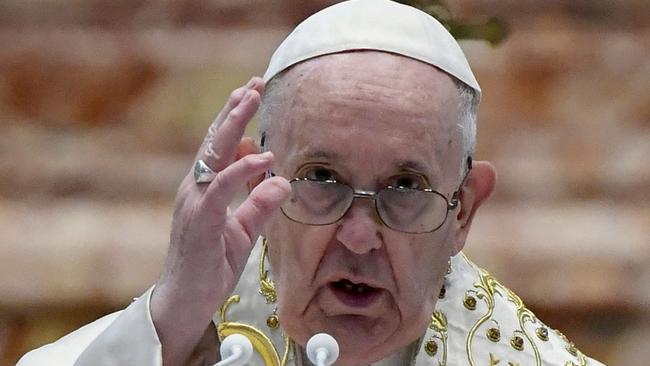
He asked God to comfort the sick, as well as those who have lost loved ones and their employment during the pandemic.
He praised medical workers and children who have missed out on school, saying everyone has been “called upon to combat the pandemic”.
“I urge the entire international community, in a spirit of global responsibility, to commit to overcoming delays in the distribution of vaccines and to facilitate their distribution, especially in the poorest countries,” he said.
“The pandemic is still spreading while the social and economic crisis remains severe, especially for the poor. Nonetheless, armed conflicts have not ended and military arsenals are being strengthened.
“This is scandalous,” he said.
Known for his fervent views on disarmament, the 84 year old Pontiff said: “There are still too many wars and too much violence in the world. May the Lord help us to overcome the mindset of war.”
He attacked military weapons, describing them as “insidious and horrible devices”.
How much better our world would, he insisted, “without these instruments of death”.
As well as noting current international zones of conflict, Pope Francis praised “the young people of Myanmar who are committed to supporting democracy and making their voices heard peacefully”.
His message also called for peace in parts of Africa, including northern Ethiopia and the Cabo Delgado province of Mozambique.
READ MORE:533m Facebook users’ data leaked online
Anne Barrowclough8.40am:Victoria records no new cases
Victoria has again recorded no new local cases, out of 7,077 test results received.
Yesterday there were no new cases reported. 7,077 test results were received. Got symptoms? Get tested - #EveryTestHelps.
— VicGovDH (@VicGovDH) April 4, 2021
More later: https://t.co/lIUrl0ZEco#COVID19Vic#COVID19VicDatapic.twitter.com/LAl8f74xK6
Nicholas Jensen7.30am:Littleproud defends government’s vaccine rollout
National’s Deputy Leader David Littleproud has defended the federal government’s approach to the vaccine rollout amid rising tensions with the states, saying there was always clarity about vaccine supply and that Australia has been “badly let down” by the EU.
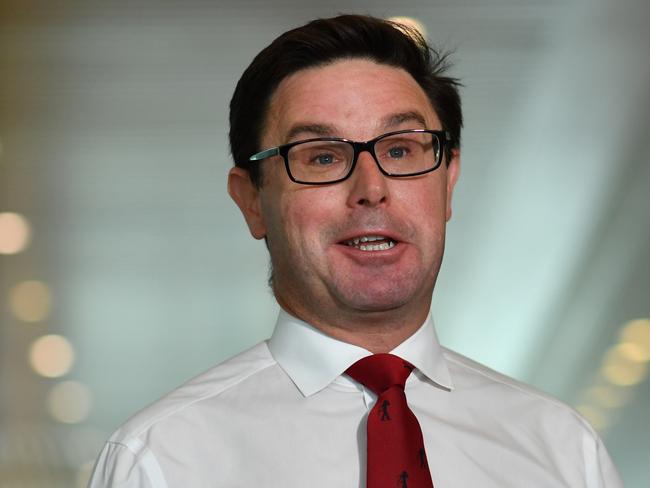
“It’s about being transparent and honest,” he told Nine’s Today show this morning. “This is the biggest vaccination program our country has ever seen and it’s important we understand what’s happening with it. The arithmetic is simple on this. We are three million short because of the EU, who cut us short”.
Asked whether the federal government was shifting blame onto the states, Mr Littleproud said “we need to trust one another”.
“We need the states to trust the manufacturing now taking place in Melbourne,” he said.
“Let’s look after our own sovereignty… Australians should be proud of the fact we can manufacture here despite being let down by the EU. We ramped up after we got TGA approval to make sure it’s safe for Australians and that’s what we are doing”.
READ MORE:Vaccine army doubles coronavirus fight
Nicholas Jensen7am:Tighter restrictions in India as cases surge
India has announced new COVID-19 restrictions in Maharashtra after a sharp rise in COVID-19 infections in the last week.
Since Saturday, India reported more than 93,000 new cases. The state of Maharashtra accounted for a record 49,447 new cases.
The state will shut shopping malls, cinemas, bars, restaurants and places of worship from the beginning of this week. Health authorities will also impose a full lockdown at weekends.
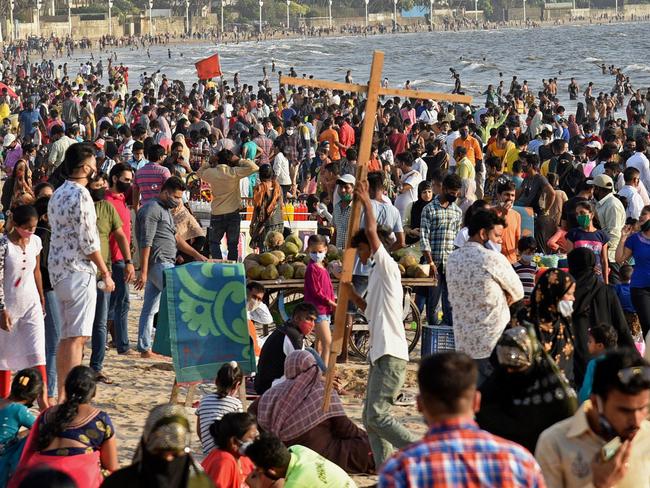
Nawab Malik, a minister in Maharashtra’s state government, said the government would impose a night curfew across the state from 8 pm to 7 am commencing from Monday.
Maharashtra’s Chief Minister Uddhav Thackeray met leading industrialists before introducing the restrictions.
Millions of migrants travel from across India to secure employment in the country’s wealthiest western state which accounts for approximately 16 per cent of the country’s economic output.
Mr Malik ensured manufacturing and construction activity would be permitted to continue despite new COVID-19 restrictions.
India’s Prime Minister Narendra Modi chaired a meeting on Sunday to review the COVID-19 situation and vaccination program.
READ MORE:Venetians on board for future without cruise ship riches
Nicholas Jensen6.45am:Man transferred to ICU in Adelaide hospital still critical
A man in his 40s who was rushed to Royal Adelaide Hospital yesterday after contracting the South African variant of COVID-19 remains in a critical condition.
The man remains in ICU, and is one of 12 active cases in South Australia with COVID-19, all of whom acquired the virus overseas.
SA Health transferred the man from a dedicated medi-hotel in Adelaide yesterday.
Acting Chief Public Health Officer Michael Cusack said the man was believed to have the South African variant.
South Australian COVID-19 update 4/4/21. For more information, go to https://t.co/mYnZsGpayo or contact the South Australian COVID-19 Information Line on 1800 253 787. pic.twitter.com/6691UOyJz1
— SA Health (@SAHealth) April 4, 2021
“One person was taken from Tom’s Court [medi-hotel] to the Royal Adelaide Hospital this morning because they were unwell and are currently being assessed there,” Dr Cusack said.
“Clearly if someone is deemed unwell enough that they have to go to hospital, we have concerns for their welfare, but obviously they are in the right place.”
Dr Cusack yesterday said the man had been suffering breathlessness.
The man is the first person to be admitted to ICU with COVID-19 in South Australia since last May.
READ MORE:Dutton warns contractors on submarine, frigate deliveries
Nicholas Jensen6.30am:Engineers investigate PA Hospital clusters
A crew of Brisbane engineers is set to launch an investigation into the Princess Alexandra Hospital’s Ward 5D in a bid to understand the origins of two separate COVID-19 clusters.
Last night Queensland Health confirmed an engineering team would be undertaken into Ward 5D — where super spreader patients were treated at different times last month — to assess the “possible factors which may have contributed to virus transmission”.
The room, Ward 5D, is said to be the common link in both outbreaks, which saw 22 infections, including four health workers.
Genomic sequencing traced the clusters back to the patients, which included a man who arrived into Queensland from Europe and another man who was diagnosed with COVID-19 after returning from India.
The first cluster, which grew to ten infections, included a doctor and nurse, both of whom treated the man who travelled from Europe.
The second and more recent outbreak involves two Ward 5D nurses. One of the nurses spread the virus to friends and a male entertainer at a Byron Bay bachelorette party.
Health Minister Yvette D’Ath said no breaches had been found in the use of PPE.
“We know it’s not related to one individual and how they donned their PPE, or wore their PPE, or any breaches by any one individual because it’s happened on two occasions with four health workers over different days,” she said.
“There is a view that this is about the particular environment.”
The investigation comes after Ms D’Ath said a single area in the Royal Brisbane and Women’s Hospital could be used to treat the bulk of the state’s COVID-19 patients in the wake of the outbreaks.
Ben Packham6am:China winning Pacific vaccine diplomacy war
Australia is in a race against time to secure millions of COVID jabs for the Pacific in the next four weeks or risk a Chinese vaccine diplomacy victory that would push regional partners closer to Beijing.
Papua New Guinea has accepted 200,000 Chinese Sinopharm jabs in recent days, and Solomon Islands Prime Minister Manasseh Sogavare says Chinese vaccines are the next step in his country’s COVID response.
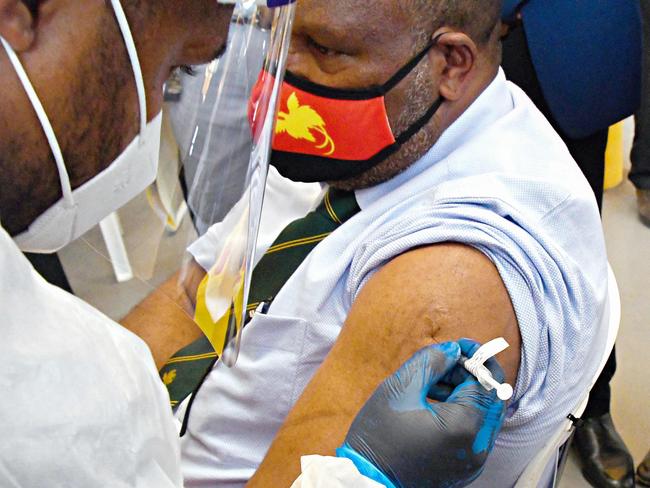
Fiji says it will also accept Chinese jabs when they are approved by the World Health Organisation, which is expected to occur by the end of the month.
Australia has donated 8500 AstraZeneca jabs to PNG to vaccinate frontline health workers amid a worsening COVID crisis, but has been unable to secure a promised one million shots for the country from Europe.
Burnet Institute director Brendan Crabb said PNG, which he believes now has more than one million COVID cases, needed to source vaccines wherever it could.
He said once the Chinese vaccines received WHO approval, “I see no reason why they shouldn’t be used in PNG as well”.
Read the full story here.
Richard Ferguson5.45am:Unis must look beyond China, India for students
Australia’s foreign student intake from emerging markets such as Africa and South America will have to double if universities are to match enrolments from China and India, after the Morrison government urged the sector to reduce its reliance on the Asian superpowers.
Education Minister Alan Tudge last week warned the makeup of the higher education export market — in which 55 per cent of all foreign students are from China and India — was fraught. He said there must be a greater emphasis on finding emerging markets and offering more online options.
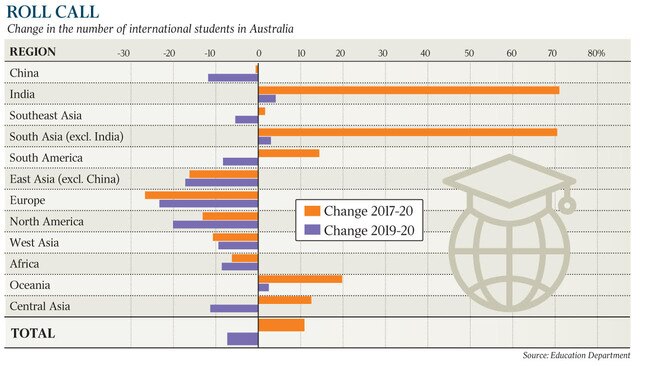
Analysis by The Australian shows all 11 countries in Southeast Asia accounted for 139,000 student enrolments in Australia’s higher education system last year and seven countries in South Asia (including Pakistan and Nepal) amounted to more than 119,000 enrolments.
South America’s eight nations accounted for just over 75,000 students, and Africa’s 23 countries made up only 12,663 enrolments.
Those figures pale in comparison with the more than 230,000 Chinese students enrolled in Australian universities last year and the more than 148,000 Indian students.
ANU higher education analyst Andrew Norton said while there had been strong growth out of South America and South-East Asia in particular, emerging foreign student markets would likely never rival China and India.
Read the full story here




To join the conversation, please log in. Don't have an account? Register
Join the conversation, you are commenting as Logout